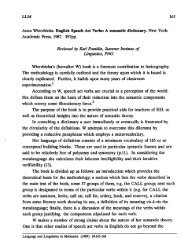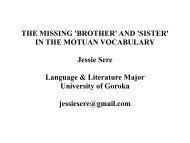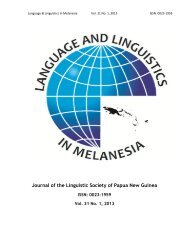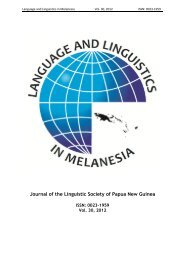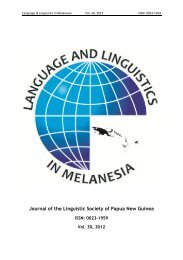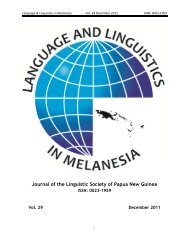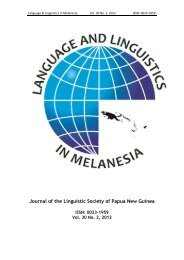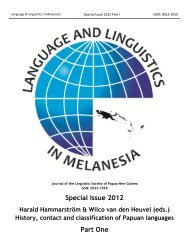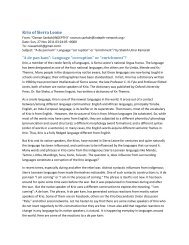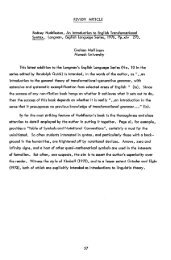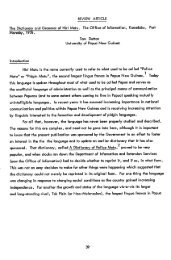Journal of the Linguistic Society of Papua New Guinea
Journal of the Linguistic Society of Papua New Guinea
Journal of the Linguistic Society of Papua New Guinea
You also want an ePaper? Increase the reach of your titles
YUMPU automatically turns print PDFs into web optimized ePapers that Google loves.
Language & <strong>Linguistic</strong>s in Melanesia Vol. 30 No. 2, 2012 ISSN: 0023-1959<br />
II. DESCRIPTIVE SYNTAX<br />
In an attempt to capture <strong>the</strong> relationships between words in <strong>the</strong> sentence, descriptive linguistics<br />
widened <strong>the</strong> scope <strong>of</strong> <strong>the</strong> ‘Parts <strong>of</strong> Speech’ concept to include groups <strong>of</strong> words (phrases), viewed as<br />
categories <strong>of</strong> lexical items defined by <strong>the</strong>ir morphological or syntactic behavior (Tallerman: 1998, p.<br />
31). Major word classes, such as Verb Phrase (VP), Noun Phrase (NP), Adjective Phrase (Adj.P), and<br />
Prepositional Phrase (PP), are distinguished by <strong>the</strong> morphology, functions, and patterns <strong>of</strong> distribution<br />
<strong>of</strong> phrase ‘heads’ [this covers both <strong>the</strong> slots <strong>the</strong> words can appear in and <strong>the</strong> modifiers that co-occur<br />
with <strong>the</strong>m]. Because <strong>of</strong> <strong>the</strong> primary focus on single words (like ‘heads’ in a phrase), and because<br />
languages vary so widely in <strong>the</strong>ir physical structures, descriptive syntactic analysis concludes that word<br />
classes in different languages also vary:<br />
‘…Groups <strong>of</strong> closed class words <strong>of</strong>ten pair up with a specific lexical word, such as noun or an<br />
adjective. To count as a distinct word class, a set <strong>of</strong> words must have some properties which<br />
distinguish <strong>the</strong>m from o<strong>the</strong>r word classes in <strong>the</strong> language. If we don’t find any such properties,<br />
<strong>the</strong>n it would be unscientific to make artificial divisions in <strong>the</strong> data. … It is important … not to<br />
expect all languages to look <strong>the</strong> same. For instance, we shouldn’t think that just because, say,<br />
English and Italian have an open class <strong>of</strong> adjectives, <strong>the</strong>n all languages must have one. On <strong>the</strong><br />
o<strong>the</strong>r hand, linguists now know that languages don’t vary from each o<strong>the</strong>r at random. We can<br />
expect <strong>the</strong>re to be a finite set <strong>of</strong> possible different word classes, from which each language<br />
‘selects’ its own set <strong>of</strong> classes’ (Tallerman: 1998, p. 49).<br />
Based strictly on morphological description, <strong>the</strong> Igbo language <strong>of</strong> Nigeria appears to have only eight<br />
adjectives, 1 while o<strong>the</strong>r languages have ‘very few or even no prepositions’ (Tallerman: 1998, p. 34) –<br />
Latvian, for example, has no preposition ‘in’!<br />
The sheer diversity <strong>of</strong> linguistic forms seemingly contradicts <strong>the</strong> idea <strong>of</strong> universal principles <strong>of</strong> human<br />
understanding which underlie and actively shape <strong>the</strong> grammars <strong>of</strong> all human languages. Yet, we know<br />
that looks can be deceptive – to paraphrase Shakespeare, ‘What’s in a form’ All human languages,<br />
regardless <strong>of</strong> <strong>the</strong>ir physical forms, express <strong>the</strong> same logical relationships that human minds see between<br />
things in our 4-D physical world – relationships based on resemblance, contiguity in space/time, and<br />
causality. Latvian may lack <strong>the</strong> preposition ‘in’, but that does not mean that this spatial relationship does<br />
not exist in Latvian minds; it simply means that <strong>the</strong> speakers use a different way <strong>of</strong> expressing it:<br />
Nominative: galds (table) Locative: galdaa (in <strong>the</strong> table)<br />
aviize (newspaper)<br />
aviizee (in <strong>the</strong> newspaper)<br />
While <strong>the</strong> forms <strong>of</strong> <strong>the</strong> physical structures (morphology) differ, <strong>the</strong>ir essence (meaning) remains <strong>the</strong><br />
same. Formal tests used to categorize phrases by <strong>the</strong> morphological ‘looks’ and patterns <strong>of</strong> distribution<br />
1 ‘Igbo has 8 adjectives (<strong>the</strong>y are actually converses); <strong>the</strong> English equivalents are: hot/cold; young/old; black/white;<br />
beautiful/ugly. The 'dispute' however rests on nouns that function as adjectives which some linguists insist should<br />
be classified as adjectives’ (Pr<strong>of</strong>. Ogunkeye, Funmi: <strong>Linguistic</strong>s, University <strong>of</strong> Jos, Nigeria).<br />
32



